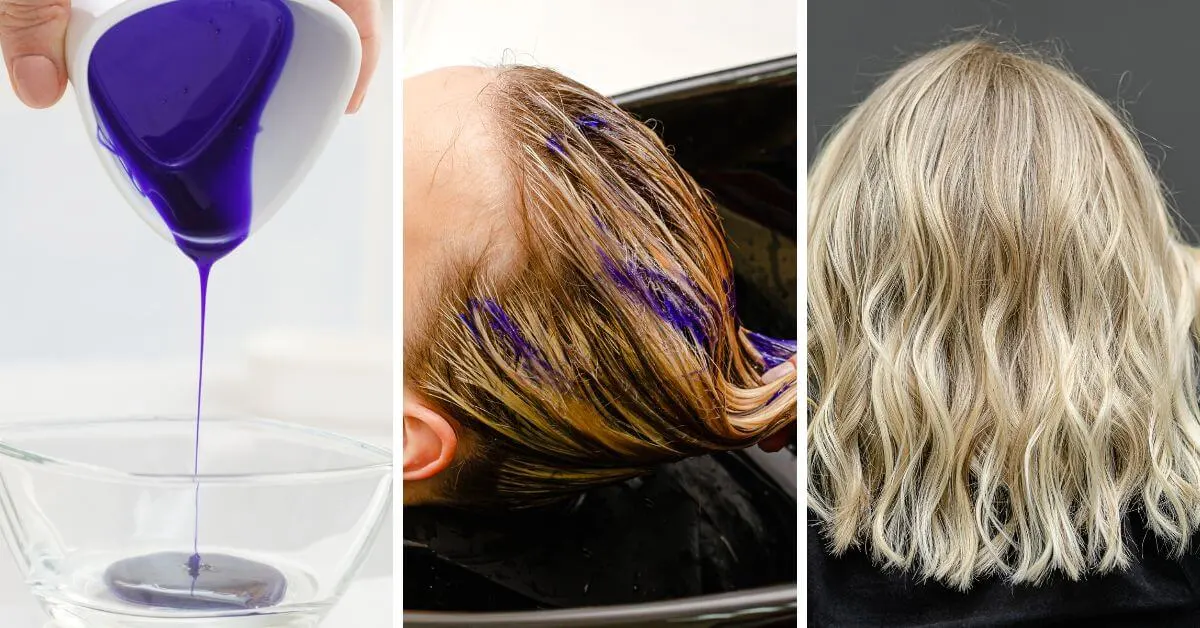Updated December 8, 2022
Are you expecting a baby? Congratulations!
Pregnancy brings about so many changes and one of those is changes to your hair care routine.
One common question pregnant women have is Can I use purple shampoo while pregnant?

We’re here to help answer this question.
Pregnancy comes with enough changes as it is, so let us alleviate one worry (Yes, you can use purple shampoo while pregnant!) and give you some clarity on shampoo and hair product use during pregnancy.
Can I use purple shampoo while pregnant?
Yes, you can use purple shampoo while pregnant.
According to our OB/GYN Dr. Doug Penta, MD, it is generally considered safe to use a purple shampoo once or twice a week during pregnancy and you should keep the following tips in mind when using purple shampoo:
- Use only a small amount at a time.
Use the least amount of shampoo you need to keep your hair looking platinum blonde on silver.
In my experience, during pregnancy, you can get away with using decreased amounts of many products including shampoos, and get the same or better results.
- Do not let the shampoo sit in your hair for very long during pregnancy
Put the shampoo in your hair and rinse it out right away.
You’ll likely find you don’t need to leave it on very long to get the desired effect.
- Use a fragrance-free shampoo
Choose fragrance-free shampoos, they contain fewer chemicals and are safer to use when you are pregnant.
- Choose shampoos that do not have formaldehyde, parabens, BPA, oxybenzone, triclosan, and phthalates (ACOG)
These chemicals are associated with endocrine disruption and should be avoided during pregnancy.
Look for fragrance-free shampoos vs unscented shampoos.
Unscented shampoos may still contain unsafe chemicals that are used to cancel the scent of each other out.
- Rinse hair completely
It is important to rinse your hair thoroughly and make sure all the shampoo is washed out before you use a conditioning product or style your hair.
It can be difficult when it comes to hair products to know what is safe and what is not.
What is purple shampoo and what does it do for your hair color?
Purple shampoo helps you maintain healthy-looking colored hair.
When used on blonde or silver hair purple shampoo helps to remove any yellow color caused by oxidation, hard water buildup, and chlorine deposits while adding a cool er ash tone.
This type of shampoo is formulated with purple and blue pigments that will neutralize brassiness in blonde hair.
If you dye darker hair blonde you know that without adding ash or purple tone your hair ends up with heavy orange tones.
I tell people that without using purple shampoo and a cool blonde color on top of my bleached hair I look like I have a safety cone on my head.
The less frequently you color your hair during pregnancy the better, not because it is unsafe (it isn’t considered unsafe) but because hair coloring can have a strong odor which can cause you to feel nauseous and cause headaches during pregnancy.
Anything that let me extend the time between salon trips during my pregnancies was a good thing!
What are the risks associated with using purple shampoo during pregnancy?
There can be a few risks of using purple shampoo during pregnancy that you should be aware of.
While the primary ingredient in purple shampoo – magnesium sulfate – is generally considered safe.
Some people can develop allergic reactions or develop rash from the dyes used in colored shampoos and hair coloring during pregnancy.
It is best to test the purple shampoo on a small area of your skin before using it on your hair while pregnant.
Even if you have been using it for years.
Choose a purple shampoo that does not have formaldehyde as an ingredient.
Our OB/GYN suggested you may want to skip using purple shampoo during your first trimester of pregnancy if you are concerned.
How is purple shampoo different from other shampoos on the market?
Purple shampoo is different from other shampoos in that it is specifically designed to help maintain the color of blonde, silver, silver-beige, or gray hair.
Other shampoos, on the other hand, may be designed for a specific hair type like shampoo for dry hair, oily hair, or curly hair.
How to find a safe and effective purple shampoo during pregnancy?
When it comes to finding a safe and effective purple shampoo during pregnancy, look for products that are free of harsh chemicals and fragrances, such as formaldehyde.
Also, opt for shampoos that contain natural ingredients like aloe vera or coconut oil to help nourish the hair while protecting against fading and brassiness.
Can you use a touch of silver shampoo when pregnant?
Yes, you can use a touch of silver shampoo while pregnant.
Silver shampoos contain blue or purple pigment to counteract brassy tones in your hair.
It is a pregnancy-safe shampoo.
The primary ingredients in silver shampoo are generally considered safe during pregnancy.
It’s important to note that some silver shampoos contain ammonia or bleach, which should not be used during pregnancy.
Top five best purple shampoo brands for pregnant women
There are many purple shampoos on the market, not all of which may be safe for you to use during pregnancy
As someone who bleached her hair blonde for many years, I’m a former weekly user of purple shampoo.
I needed a safe purple shampoo to use when pregnant.
Here is a list of my favorite purple shampoo brands that are safe to use during pregnancy:
1. L’Oreal Paris Hair Care Elvive Color Vibrancy Purple Shampoo
2. Matrix Total Results So Silver Deep Conditioning Purple Shampoo
3. Clairol Professional Shimmer Lights Original Conditioning
Shampoo & Color Depositing Purple+Shampoo
4. Joico Color Balance Purple Shampoo
5. Garnier Fructis Color Shield Purple Shampoo
What shampoos and hair products to avoid while pregnant?
There are some shampoos that you should not use during pregnancy without talking to your doctor or midwife.
- Hair straightening products:
Hair straightening shampoos contain formaldehyde.
Formaldehyde is a known carcinogen and can be harmful when inhaled or absorbed through the skin.
You should not use these products on your hair during pregnancy.
Exposure to formaldehyde during pregnancy has been associated with birth defects and miscarriages
- Hair bleaching products:
Hair bleaching products contain chemicals such as ammonia, hydrogen peroxide, and bleach.
These products may increase your risk of birth defects and other health problems during pregnancy.
Talk to your doctor or midwife before you bleach or continue bleaching your hair during pregnancy.
- Dry shampoo:
The dry shampoos contain talc and other chemicals that can be harmful when inhaled.
They do make non-toxic dry shampoos, but even those should be limited to using once a week during pregnancy.
Your scalp is prone to dryness during pregnancy and using dry shampoo more than once a week can make the problem worse.
It can cause rashes, breakouts, and even hair breakage.
- Prescription Dandruff Shampoos:
Prescription dandruff shampoos can contain sulfur, selenium sulfide, zinc pyrithione, or coal tar.
You should not use these shampoos unless your doctor or midwife says you should.
Avoid using it during the first trimester if possible.
- Prescription antifungal shampoo:
Prescription antifungal shampoos can contain selenium sulfide, ketoconazole, and ciclopirox.
These ingredients are not recommended during pregnancy because they have not been studied in depth.
If they must be used, you should try to avoid using them during the first trimester and only for brief periods during the second and third trimesters.
- Shampoo that has parabens:
Parabens are preservatives that can be found in many shampoos and other skincare products.
They have been linked to hormonal endocrine disruption, which is why it’s best to avoid them during pregnancy.
Hormone (endocrine) disruption during pregnancy is linked to a number of potential negative health outcomes for you and your developing baby.
Some of these effects include increased weight gain and an elevated risk of gestational diabetes.
Hormone disruption during pregnancy can also affect the development of the baby’s organs and nervous system, potentially leading to birth defects and other developmental issues.
In some cases, hormone disruption during pregnancy can also lead to preterm labor and delivery.
A number of adverse birth outcomes have been seen including preterm birth and low birth weight.
Look for shampoos that are labeled as “paraben-free” or use natural shampoos.


